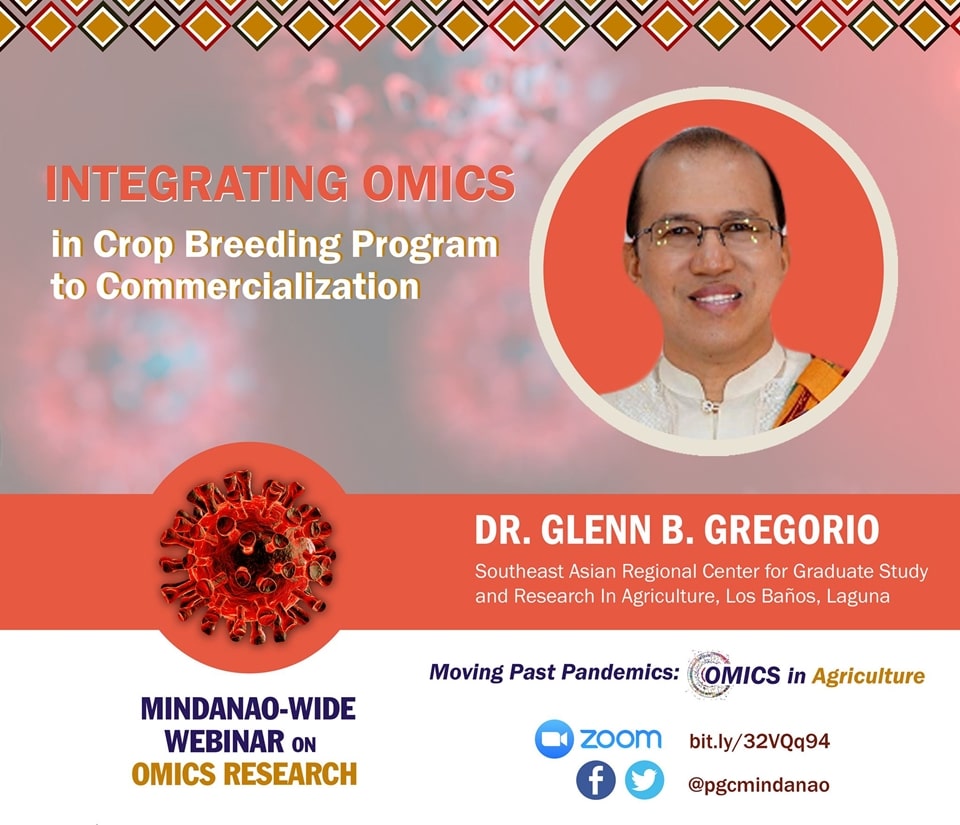
As agricultural research on omics as an emerging field of scientific technology that involves the study of molecular interactions found in living organisms becomes important especially during the pandemic, Dr. Glenn B. Gregorio, Director of the Southeast Asian Regional Center for Graduate Study and Research in Agriculture (SEARCA), discussed the importance of integrating omics in crop breeding program up to commercialization in the Mindanao-Wide Webinar on Omics Research, Moving Past Pandemics: Omics in Agriculture on 9 October 2020 held via Zoom.
The webinar series organized by the Philippine Genome Center Mindanao kicked off with a discussion of omics research in agriculture followed by a webinar using omics on food and health by selected Filipino scientists and researchers in the Philippines and abroad. The purpose of the webinar is to share potential applications and future challenges and solutions of omics technologies in mitigating impacts of the COVID-19 pandemic.
In the course of the webinar, Dr. Gregorio suggested a process in implementing a modern breeding program that considers practical factors like developing a crop master plan where breeding strategies will be laid out. This plan will include crop market analysis or market intelligence, strength-weakness-opportunity-threat analysis by market segment, and breeding strategies.
He stressed that "the future for crop improvement in the tropics is incredibly bright, built on a strengthening collaboration between the academic community and commercial crop breeders. Crop improvement seems slow in the view of business and other disciplines since developing commercially-ready products takes a long process. Many are impatient with this process and offer better techniques and tools to shorten it but still fail in the implementation of a new breeding program and much more in the commercialization stage."
Dr. Gregorio also shared the current issues in agriculture that had adverse effects in omics research. Those are increased productivity, product quality, resistance to pest and diseases, market of produce, climate change, and ASEAN Economic integration.
Zooming in the lens of the current rates of yield gain, he insinuated that the growth in global rice yield has slowed. The recent levelling off in rice yields highlighted the need to introduce new sources of germplasm, genetic variation, and modern breeding techniques into existing rice breeding program.
He further suggested that, "even with little change in harvested area what needs to be done is to increase the rice production or cereal demand in the next 10 years. We need to mechanize our farm lands and adapt digital agriculture; use of smart seeds which are high quality, pest and disease resistant, climate change ready." Gregorio emphasized the innovative ways in doing research and extension by considering the business component, value addition to produce, and market-driven and product-oriented research for development, "we need young and smart people to apply these technologies and how to implement this innovative research."
The SEARCA Director also imparted a few learnings from the field of agribiotechnology. He said, "modern biotechnology is changing fast, therefore, we have to be responsible and realistic in showing the potentials of this technology."
Moreover, the stages in modern crop breeding program were given a spotlight during the session which are: review of existing crop breeding programs, develop a crop master plan to include breeding strategies, establish the integrated breeding platform towards speeding genetic gain, and engagement of the team and effective communication to ensure implementation.
Dr. Gregorio also gave emphasis on SEARCA’s new paradigm towards accelerating transformation through agricultural innovation (ATTAIN) in line with its 11th Five-Year Plan (2020-2025).
"The new plan envisages SEARCA to be the leading enabler and champion of Agriculture and rural development in Southeast Asia with the overall goal of elevating the quality of life of agricultural families through sustainable and resilient livelihoods and access to modern networks and innovative markets," he affirmed.
He finished his discussion by emphasizing the importance of genomics in agriculture. "The reality of genomics in agriculture is won or lost at the farmer and consumer level, where applicability and sustainability are tested."
His co-speaker during the kick-off of the omics research webinar was Dr. Lynn Esther E. Rallos, a faculty of the Science Department, College of Natural Sciences and Mathematics of the Mindanao State University (MSU-CNSM) in General Santos City. The webinar is moderated by Dr. Annabelle Novero of PGC Mindanao.